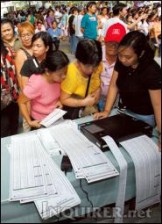
Next year’s midterm elections would most likely be automated.
Voting 11-3, the Supreme Court on Wednesday upheld the validity of the poll body’s P1.8-billion contract with Smartmatic-TIM for the purchase of 82,000 voting machines used in the 2010 elections.
Ma. Victoria Gleoresty Guerra, acting Supreme Court spokesperson, said the high court threw out four separate petitions questioning the decision of the Commission on Elections (Comelec) to buy the precinct count optical scan (PCOS) machines from Smartmatic.
Guerra said the court also lifted the temporary restraining order (TRO) it issued on April 24 that prevented the Comelec and Smartmatic from consummating the deal.
“The court found that the main contract for the automated election system between [the] Comelec and Smartmatic containing the option to purchase the PCOS machines was still existing when Smartmatic extended the period of the said option,” Guerra told a news briefing after the special full-court session.
She said the court also deemed the contract valid since the “performance security bond had not yet been returned to Smartmatic” when the Comelec decided to exercise its option to buy the voting machines.
Contract may go on
“The Comelec is now free to implement the contract for the purchase of the PCOS machines,” Guerra said.
“(It was) expressly stated in the (original) contract that the return of the performance bond will terminate the contract,” she said.
According to Guerra, the petitioners have 15 days after they receive a copy of the decision to file a motion for reconsideration.
She also clarified that the resolution cannot be considered a reversal of the decision to issue a TRO since injunctive orders are not decided on the merits of the case.
Associate Justice Diosdado Peralta wrote the decision for the full court. Acting Chief Justice Antonio Carpio and Associate Justices Presbitero Velasco Jr., Teresita Leonardo-de Castro, Lucas Bersamin, Marianito del Castillo, Roberto Abad, Jose Perez, Jose Mendoza, Ma. Lourdes Sereno and Bienvenido Reyes concurred with him.
Associate Justices Martin Villarama, Arturo Brion and Estela Perlas-Bernabe, one of President Aquino’s appointees to the Supreme Court, disagreed with the majority opinion.
‘Very good decision’
Comelec Chairman Sixto Brillantes Jr. welcomed the decision.
“It’s a very good decision,” Brillantes told reporters. “But more importantly, I want to speak with the petitioners [to request them] not to appeal [the decision]. We should just unite so that the elections in 2013 would be smooth and credible.”
Brillantes said he wanted to see if the decision was immediately executory, although he added that he was sure the ruling could still be appealed.
What is important, he added, is that the justices lifted the temporary restraining order on the purchase.
He said the Comelec was open to reconciling with, and even soliciting the assistance of, the critics of the PCOS machines so that the Comelec could perfect its automated elections system.
“I would like to invite them all to a meeting,” Brillantes said. “I’ve told them before [in the hearings at Congress] that I wanted to meet them, especially the vocal ones. Maybe we, all of us, should just sit down and work together and forget all this [dispute].”
With the lifting of the TRO, Brillantes said the Comelec would quickly resume its preparations, beginning with the publication of bidding notices for services, such as the printing of ballots, purchase of ballot boxes, delivery and storage of equipment and election paraphernalia, technical personnel deployment, among other things.
PCOS opponents
Among those who challenged the Comelec’s authority to buy the PCOS machines were Davao City Archbishop Fernando Capalla, the group Automated Election System Watch (AES Watch) led by former Vice President Teofisto Guingona Jr. and the Solidarity for Sovereignty led by Ma. Linda Montayre.
In its petition, the AES Watch argued that the Supreme Court should void the contract because the Comelec acted with grave abuse of discretion when it opted to buy the PCOS machines without holding a public bidding.
The group also cited the security risks and glitches that the voting machines went through during the 2010 elections as part of the reasons why the Comelec should not reuse them.
It maintained that the Comelec’s option to buy the machines under its old contract with Smartmatic expired in April 2011, making the deed of sale it executed last March an “entirely new and negotiated contract” made without a public bidding.
‘Vulnerabilities’
“[The] Comelec chose to cast a blind eye on, and a deaf ear to, these officially and publicly confirmed vulnerabilities, defects and inadequacies of Smartmatic’s PCOS machines and related equipment,” AES Watch said.
The group argued that a new bidding should be held because the PCOS machines failed to comply with the “minimum system capabilities” set by Republic Act No. 9369, or the Amended AES Act of 2007.
AES Watch also assailed the Comelec for ignoring the recommendation of its advisory council that rejected further use of the PCOS machines due to glitches and the deactivation of its security features. With reports from Jerome Aning and Tetch Torres
Originally posted at 04:36 pm | Wednesday, June 13, 2012